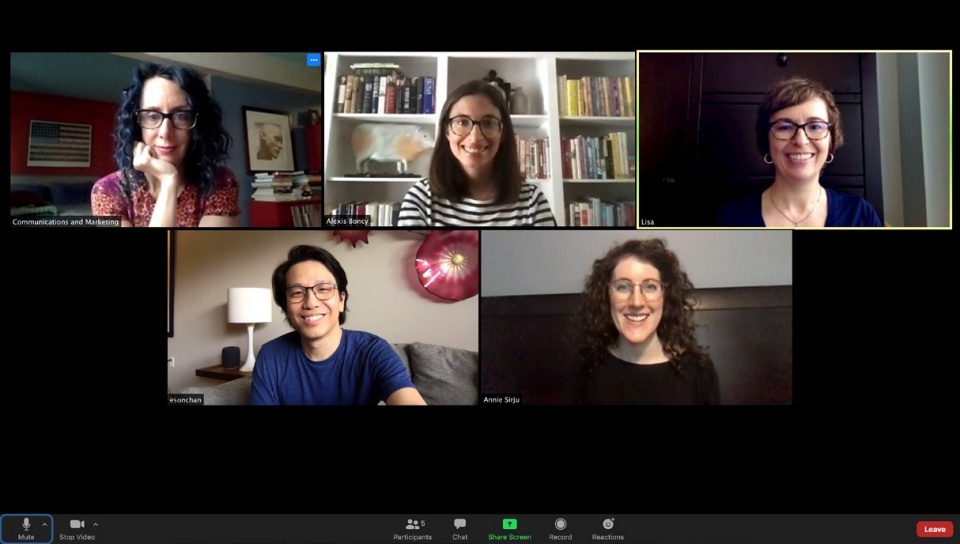Columbia College | Columbia University in the City of New York
Notes on a Surreal Season

Jörg Meyer
I am enormously grateful for our situation, but as the weeks have passed, my homesickness has grown acute. I miss our apartment in Brooklyn; I miss my office in Morningside Heights. I miss the hour-long commute that took me from one to the other, a trip I often cursed (fie, MTA!) but that I now understand offered precious personal time to read or listen to podcasts or even nap until, on my luckier days, I woke just as the conductor announced my stop.
These are small and easy losses to catalog. There have been losses far, far greater in recent months — overwhelming in their scope and complexity, impossible to fully comprehend. I struggle to make sense of all that’s happening: COVID-19, with its wrenching human and economic toll; the brutal murders of Ahmaud Arbery, Breonna Taylor and George Floyd and the subsequent protests — a communal keening that reflects too many years of injustice, heartbreak and anger, and which has demanded a national reckoning.
We each must decide how we will respond to these crises: How do we contend with their many facets; with whom will we share our thoughts and feelings; what calls to action will we issue or answer? These are conversations that begin quietly, in moments of self-reflection, and open outward to engage family, friends, community and others.

The CCT team, clockwise from top left: Deputy Editor Jill C. Shomer, Editor-in Chief Alexis Boncy SOA’11, Executive Editor Lisa Palladino, Associate Editor Anne-Ryan Sirju JRN’09 and Art Director Eson Chan.
Of course, the community we have in common is that of Columbia College. As Dean James J. Valentini eloquently addresses in his message, we are part of an institution where “much of what our undergraduates really explore is knowledge of the self and of their own humanity, in the context of others.” The foundation that the College instills in its students and alumni, and the awareness it fosters — for anyone who swims in its proverbial waters — have prepared all of us to consider the questions of equity, ethics, responsibility and democracy that are suddenly, urgently vital.
In this issue’s cover story, we take up questions of responsibility relating to another of today’s most pressing issues: climate change. There, the spotlight is on activist Alex Loznak ’19, who, with 20 other young people, is suing the U.S. government for the right to a clean environment. The groundbreaking case, Juliana v. United States, charges that our leaders have caused undue harm to its plaintiffs by enabling and even encouraging policies that promote fossil fuels and carbon dioxide pollution. We look both at the remarkable case and Loznak’s personal story — his crusade is inspired by his family’s 152-year-old Oregon farm, which has become increasingly threatened by drought and wildfire.
Elsewhere in the issue, we invited 14 alumni to contribute reflections on the changes to their daily lives during the early months of the pandemic. Our original aim had been to create a time capsule of sorts, but as the project developed, we found ourselves moved and heartened in ways that we hadn’t anticipated. We hope it does the same for you.
And speaking of heart, don’t miss our graduation coverage. Class Day and Commencement went virtual in lieu of traditional ceremonies, and we highlight 10 seniors from the remarkable Class of 2020. The lessons they’ve taken from the extraordinary circumstances of their last semester — and the intentions they now carry into the world — are truly inspiring.
In case you missed our June 14 email announcement, I’d encourage you to read our recent Online Exclusive, a Q&A with Dr. Ashish K. Jha ’92, director of Harvard’s Global Health Institute. In it, Jha — whom you might recognize from appearances on MSNBC and other networks — offers an optimistic prediction of our future, but doesn’t mince words about what’s gone wrong with the federal response to COVID-19. We also announced that we’re posting this issue online only, having paused publication of the print magazine due to the financial implications of the pandemic.
We’ll be back with a print magazine in the fall. In the meantime, I welcome your feedback at cct@columbia.edu. Be well.
Alexis Boncy SOA’11
Editor-in-Chief
Issue Contents
Published three times a year by Columbia College for alumni, students, faculty, parents and friends.
Columbia Alumni Center
622 W. 113th St., MC 4530, 6th Fl.
New York, NY 10025
212-851-7852
cct@columbia.edu
Columbia Alumni Center
622 W. 113th St., MC 4530, 4th Fl.
New York, NY 10025
212-851-7488
ccalumni@columbia.edu

